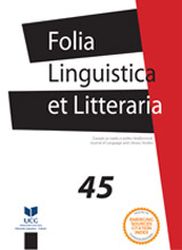FOUCAULDIAN CONCEPT OF “DEATH OF MAN” IN THE WAVES
FOUCAULDIAN CONCEPT OF “DEATH OF MAN” IN THE WAVES
Author(s): Saeb Shabani, Laleh Atashi, Farideh PourgivSubject(s): Studies of Literature, Theory of Literature
Published by: Filološki fakultet, Nikšić
Keywords: Bio-power; Deployment of Sexuality; Death of Man; Episteme; Michel Foucault; The Waves
Summary/Abstract: Virginia Woolf significantly impacted modernism as an experimental writer and challenged the conventional principles regarding realism. In this paper, Foucault's views on bio-power and the death of Man are used to analyze the main female characters in the novel The Waves, in order to see how their identities are shaped in a patriarchal society. It is argued that the stereotypes of femininity are internalized within the individuals by the normalizing power, and every particular anomaly is excluded. Thus, women might have predetermined fates. Sexuality as a social construct is an anchor for shaping women’s identities and destinies. Bio-power, which is a socio-political kind of power in the modern world, deploys sexuality in four great different strategic unities, namely, a hysterization of women’s bodies, a pedagogization of children’s sex, a socialization of procreative behavior, and a psychiatrization of perverse pleasure, to manage and control individual’s life and population. Due to the role of biopower and its deployment of sexuality, the repressive hypothesis regarding sexuality is rejected. Thus, we turn into docile bodies, whereby the individual’s agency is effaced, and ultimately the death of Man occurs. The death of Man indicates that we are on the brink of a new episteme, which may bring about new possibilities only if we reconsider the way we see Man in the universe.
Journal: Folia Linguistica et Litteraria
- Issue Year: 2023
- Issue No: 45
- Page Range: 213-229
- Page Count: 17
- Language: English

